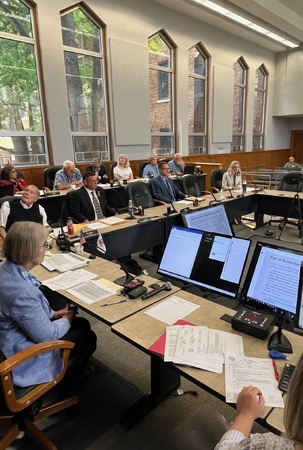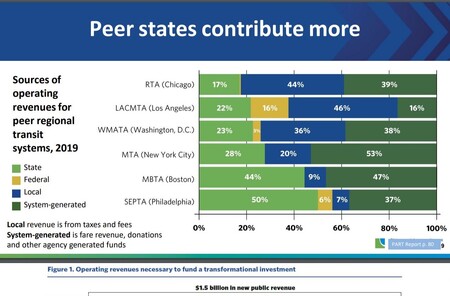
The Future of Public Transit Topic of Kane County Board Meeting
As lawmakers debate proposals to reform the region's public transit system, Kane County Board members took steps to better understand how those reforms may impact local commuters. During an informational meeting on July 23, board members listened to representatives from Metra, Pace, and the Regional Transportation Board discuss details about a looming “fiscal cliff” and calls to transform the way the transit system is governed.
Currently, the CTA, Metra, and Pace are each operated by separate boards and fall under the umbrella of the Regional Transportation Authority, which coordinates their financing. However, these agencies are projected to face a combined $730 million budget deficit by 2026, attributed to significant changes in commuting patterns and the expiration of federal COVID-19 relief funding. Transit agencies have warned that failing to address this deficit could result in drastic service cuts and fare increases.
Two Illinois lawmakers have proposed legislation to merge the three separate transit agencies into a single entity, aiming to streamline transportation and eliminate funding duplication. The proposed legislation would combine the RTA, CTA, Metra, and Pace into a single agency called the Metropolitan Mobility Authority (MMA). According to the proposal, the MMA would oversee all bus, rail, and paratransit operations in McHenry, Lake, Kane, DuPage, Cook, and Will counties.
Supporters of the MMA argue that consolidating the CTA, Metra, and Pace into a single entity would enable integrated fares and coordinated schedules across city transit, commuter rail, and suburban buses. The authority would be overseen by appointees from the governor, the Chicago mayor, the Cook County Board president, and a representative from the collar counties. Opponents believe the plan would give Chicago and Cook County more control over the finances of the agencies.
Concerns about the future of the transit agencies also extend to issues of governance and the need for new sources of funding. Potential new revenue sources include more federal funding, increases in fares, a congestion tax, and/or using tollway money. According to the Chicago Metropolitan Agency for Planning, the Chicago region spends one of the least amounts per capita on transit compared to its peer regions (see chart).
The benefits of a successful public transit system were stressed during the course of the meeting, highlighting that public transit removes millions of cars from roads and highways, reducing congestion and pollution. It boosts the economy by enabling people without cars to commute to jobs outside their neighborhoods.
Members of the Illinois Senate will host a public hearing for Kane and McHenry County on the future of public transit on August 28, 2024, at Elgin Community College.
To watch the July 23 Kane County Committee of the Whole presentation and discussion, click here. To review the recommendations by the Chicago Metropolitan Agency for Planning on the future of public transit in northeastern Illinois, click here.


